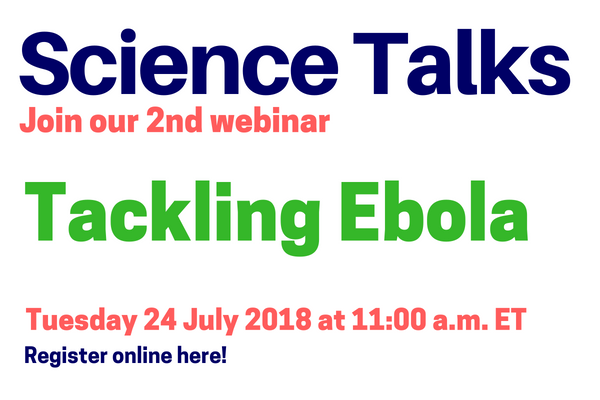
The second Science Talk on tackling Ebola will take place on Tuesday 24 July at 11:00 am EST. In this session, Dr. Peter Halfmann, Research Associate Professor at the Influenza Research Institute at the University of Wisconsin, will discuss the latest facts and figures on this infectious disease including news about vaccines. Attendees will learn more about:
- The current situation in regions affected by the Ebola virus and if there is still any danger.
- Where we stand with the research on finding a vaccine and if the latest human trials were successful.
- When the vaccine will be made available for humans affected in regions by the Ebola virus.
- What the future will bring in terms of infectious diseases, such as Ebola.
- How local journalists can better report on infectious diseases including what they should look for, what kind of questions to ask, what resources they should use.
OUR PARTNER
In partnership with Wiley, we are pleased to introduce to 10,000 science journalists globally and to everyone who is interested, a new series of webinars called Science Talks that are brought to you by The Wiley Network.
WHO IS Dr. PETER HALFMANN?
University of Wisconsin, B.S. Bacteriology // University of Wisconsin, Ph.D. Cellular and Molecular Biology
Initially, Peter wanted to pursue a medical degree after his undergraduate studies, but he became interested in infectious diseases and viruses, particularly Ebola virus, after reading Richard Preston’s “The Hot Zone”. At the beginning of his junior year, he sought out a lab at the University of Wisconsin that focused its research on virus pathogenesis and discovered the lab of Dr. Yoshihiro Kawaoka, a professor at the School of Veterinary Medicine and a world expert on influenza virus.
After being told that influenza viruses were as interesting as Ebola virus, Peter started his career in the Kawaoka group. He was a student research assistant for two years, then, after graduating with a bachelor’s degree in bacteriology, he was a technician for one year before starting graduate school in the Cellular and Molecular Biology program with Dr. Kawaoka as his mentor. Unable to conduct research with authentic Ebola virus in Wisconsin, Peter developed a novel, biologically-contained Ebola virus as part of his graduate thesis research. The biologically-contained virus resembled authentic Ebola virus but could be handled safely under non-biosafety level-4 containment. Besides being an important research tool, Peter demonstrated that the biologically-contained virus could also be used as a whole-virus vaccine to protect against Ebola virus infection.
In 2008, Peter earned his Ph.D. and decided to continue his research with Dr. Kawaoka. He received biosafety level-4 training at the NIAID’s Rocky Mountain Laboratories from Dr. Heinz Feldmann. As part of his high containment research, he continued to evaluate his Ebola vaccine. During the height of the Ebola outbreak in West Africa, Peter established a research lab at 34 Military Hospital in Freetown, Sierra Leone to examine the body’s responses to Ebola virus infection. Currently, Peter is a Research Associate Professor at the Influenza Research Institute (part of the University of Wisconsin) and manages the Ebola research efforts in the Kawaoka group. With support from the Japanese government, his vaccine is currently being produced at Waisman Biomanufacturing for a human clinical research trial in Japan. Peter still travels to Sierra Leone to follow-up with Ebola survivors and to conduct surveillance studies to identify neglected and novel viruses circulating in Sierra Leone.